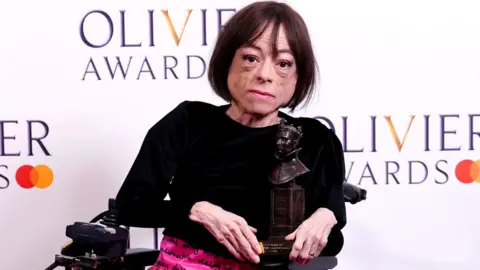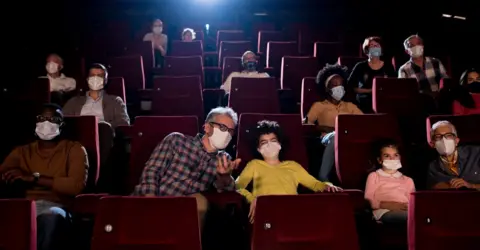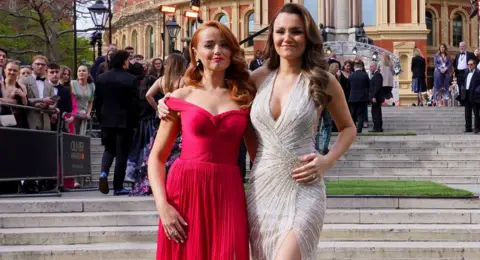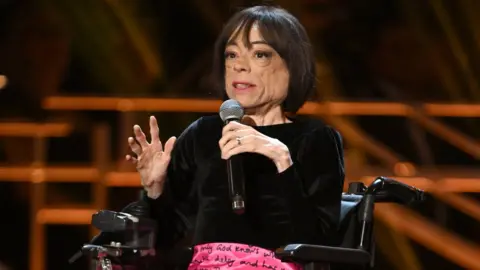Liz Carr calls for theatres to host facemask-only performances
 PA Media
PA MediaActress Liz Carr has suggested theatres consider hosting separate performances of shows for audiences who still want to wear facemasks or socially distance.
The Silent Witness star won best supporting actress at Sunday's Oliviers for her role in The Normal Heart.
As live audiences have mostly abandoned wearing masks, Carr suggested venues could offer "Covid-safer" performances.
"Theatre should remain accessible even to those of us who have health conditions," she told BBC News.
Carr, who has used a wheelchair since she was seven, is one of the most high-profile disabled actors in the UK.
Last year, she starred in The Normal Heart at The National Theatre, a play about the AIDS crisis in 1980s New York.
Speaking backstage at the Royal Albert Hall after her win, Carr explained she felt more comfortable appearing in a play than going to one herself as an audience member.
"If I'd had a five-minute speech, I would've talked about how I haven't been to the theatre in over two years. This is a frightening night for me," she said.
"Now, you could say 'yeah but you did a play, Liz, in front of 1,200 people every night.'
"Yes, but I was on stage with everybody who was testing, everybody in the cast tested every day, so I felt safer than being a random member of the public in an audience around people I didn't know."
 Getty Images
Getty ImagesCarr's win comes after the legal obligation to wear face coverings lifted in England earlier this year, as Covid restrictions eased due to the success of the vaccine rollout.
A large number of theatre, cinema and concert-goers have abandoned masks in recent months as a result, because many people find them stuffy, uncomfortable, and now arguably unnecessary.
However, Carr suggested that, while most live shows could remain facemask-free, theatres should look at reserving performances specifically for more vulnerable people who are still worried about Covid safety.
"I'm not sure about [the issue of] everybody wearing facemasks, personally I think yes, they should, in indoor environments because Covid-19 is airborne," she said.
"But I think theatres could think about having safer performances. I think they should have facemask performances that are more socially distanced. In the same way you might have a British sign language performance, I think you should have Covid-safer performances."
'Didn't feel safe'
Many arts and entertainment venues currently offer accessible showings alongside their main programmes, such as cinemas scheduling subtitled performances of films for deaf people.
But most venues do not currently split audiences who do and don't wish to wear facemasks.
Carr recalled: "Some of my friends who weren't ready to come and see the show, they came to see the dress rehearsal, because they didn't feel safe enough to come.
"So I think performances with less capacity and mandatory facemasks, every show should be doing that to make sure theatre remains accessible even to those of us who have health conditions."
 PA Media
PA MediaIn recent months, some high-profile West End stars have encouraged live audiences to wear masks.
Frozen star Stephanie McKeon tweeted in October: "A plea to amazing London audiences: Please please please wear your masks in the theatre. We are working so hard on our end to ensure everyone is safe and to keep our shows running.
'We would be so grateful if you could help us out and do your bit too. Thank you."
'Keep online performances'
Carr has a rare genetic condition called arthrogryposis multiplex congenita (AMC), which causes decreased flexibility of the joints and difficulties with movement.
Accepting her Olivier award on Sunday, Carr said: "There are so many fears about the risk of employing disabled actors, well I think this proves we can do it, we can project, we can fill a stage."
 Getty Images
Getty ImagesThe actress is a champion of accessibility, and said she hoped theatres would continue some of the measures brought in during lockdown.
Many theatres moved their shows online, opting to live-stream performances to ticket-buyers who were stuck at home amid tight Covid restrictions.
While not a viable business model in the long term, it helped theatres maintain a small amount of financial income during lockdown. But despite theatres now operating at full capacity again, Carr told the BBC: "I don't want to lose online performances.
"That was one of the good things [about lockdown], that it broke down some of the barriers during Covid, because we had to find ways of entertaining people at home, and we did that through online performances.
"So don't forget there are a whole bunch of people who still can't access the theatre, let's not forget about them."
